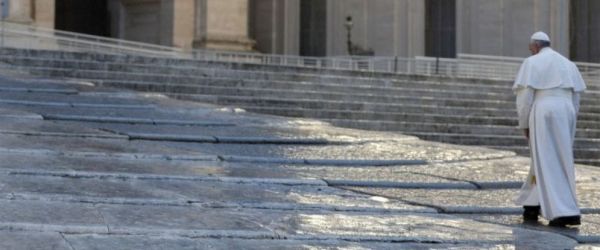Fear is one of the most terrible enemies of our Christian life. Jesus exhorts: “have no fear”, “fear not”. And Jesus describes three tangible situations that they will find themselves facing.
First and foremost the hostility of those who would like to stifle the Word of God, by sugar-coating it, watering it down, or by silencing those who proclaim it. In this case, Jesus encourages the Apostles to spread the message of salvation that He has entrusted to them. For the moment, He has transmitted it cautiously, somewhat covertly, among the small group of disciples. But they will utter his Gospel “in the light”, that is, openly; and will proclaim it “upon the housetops” — as Jesus says — that is, publicly.
The second difficulty that Christ’s missionaries will encounter is the physical threat against them, that is, direct persecution of them personally, to the point of being killed. This prophesy by Jesus is realized in every age: it is a painful reality, but it attests to the faithfulness of witnesses. How many Christians are persecuted even today throughout the world! They suffer for the Gospel with love, they are martyrs of our days. And we can say with confidence that they are more numerous than those of the earliest times: so many martyrs, just for the fact of being Christians.
[...] We should not allow ourselves to be frightened by those who seek to extinguish evangelizing power with arrogance and violence. Indeed, they can do nothing against the soul, that is, against communion with God: no one can take this away from disciples, because it is a gift from God. The only fear that a disciple should have is that of losing this divine gift, closeness, friendship with God, giving up living according to the Gospel, thereby acquiring moral death, which is the effect of sin.
Jesus indicates as the third type of test that the Apostles will have to face, the sensation, which some may feel, that God himself has abandoned them, remaining distant and silent. Here too, Jesus exhorts them not to fear, because even while experiencing these and other pitfalls, the life of disciples lies firmly in the hands of God who loves us and looks after us. They are like three temptations: to sugar-coat the Gospel, to water it down; second: persecution; and third: the feeling that God has left us alone. Even Jesus suffered this trial in the Garden of Olives and on the Cross: “Father, why have you forsaken me?”, Jesus asks. At times one feels this spiritual barrenness; we must not fear it. The Father takes care of us, because our value is great in His eyes. What matters is frankness, the courage of our witness, our witness of faith: “recognizing Jesus before men” and going forth doing good.
[Pope Francis, Angelus 21 June 2020]












